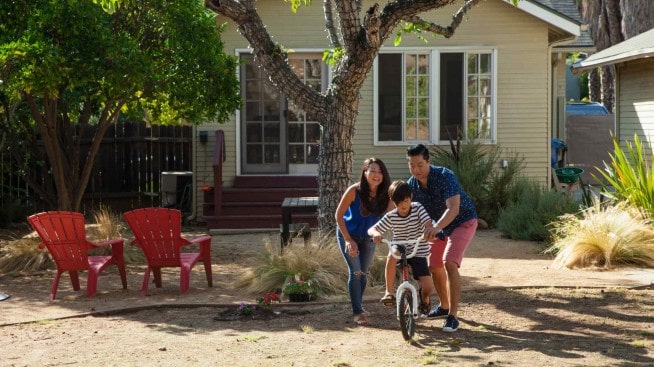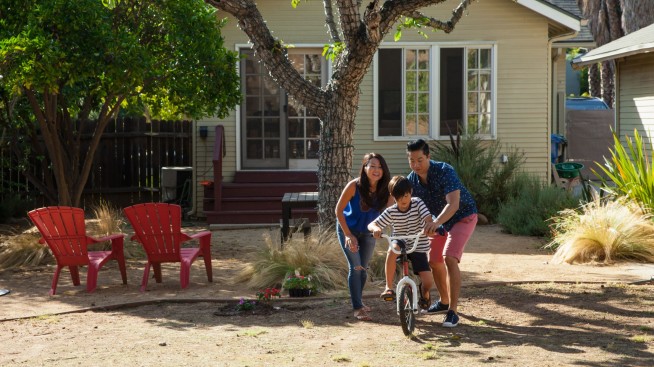Moving to Las Vegas, Nevada

Quick insights
- Las Vegas has plentiful options when it comes to entertainment and outdoor adventuring.
- The average cost of living in Las Vegas is close to national figures, with potential advantages for Nevada homeowners including a lack of a state income tax and below-average property tax rates.cost-of-living-in-las-vegas nevada-property-tax-calculator
- Key considerations for Vegas homebuyers include the home’s proximity to the Strip, energy efficiency, and preparedness for earthquakes and flooding.
As a renowned destination for entertainment and fun, Las Vegas is a unique place to call home. If you’re planning on moving to Las Vegas, you may be wondering what it’s like to live there and own a home. In this guide to moving to Las Vegas, we’ll address some of the pros and cons of living there and what potential homeowners may want to consider.
Living in Las Vegas, Nevada
Las Vegas is located in the Mojave Desert with an elevation of over 2,000 feet above sea level. Its arid climate results in very low humidity, light rainfall and hot summers with temperatures climbing above 100°F. During other parts of the year, the higher elevation keeps Vegas cooler than lower desert areas in the state.
Entertainment and activities in Las Vegas
Las Vegas' reputation as a hub for entertainment can’t be overstated. Famously, the Las Vegas “Strip” refers to a stretch of Las Vegas Boulevard with a high density of hotels, casinos, shops and performance venues. Vegas also has a strong arts presence, with monthly “First Friday” gallery openings in the Downtown Arts District to showcase work from local artists. Music and theater fans have seemingly endless options when it comes to festivals and performances, including the centrally located Smith Center.
There is more to the city than its culture and nightlife; Vegas can also be a great place for people looking to live an active, outdoor-oriented lifestyle. Situated in a basin surrounded by mountain ranges, the city’s location provides access to many natural destinations for biking, hiking, birding, camping, boating and kayaking. Notably, both Red Rock Canyon National Park and Lake Mead National Recreation Area are within an hour’s drive from the city center.
Las Vegas’ job market
Gaming and tourism are major industries supporting the Las Vegas economy, with numerous jobs in these sectors for locals. Those in entertainment, information and communications technologies may also find opportunities for growth in Vegas. However, those with career aspirations outside of these industries could find job listings a little lacking. Overall, Vegas has an unemployment rate that is 2.3% above the national average.nevada-job-marketnevada-job-market
Transportation options in Las Vegas
While most tourists get around on foot as they explore the Las Vegas Strip, Vegas isn’t known to be particularly walkable for everyday commuting. Many residents own a car or rely on public transit.
- Driving: A large amount of Las Vegas residents own a car and use it as their primary method of transportation. Though traffic near the Strip is frequently congested (up to 24 hours a day, depending on influxes of tourism), driving elsewhere in the city is a reliable option. Rideshares are also commonly used in Las Vegas by tourists and residents alike. Major highways include I-15 and I-11, which cross each other diagonally in the center of the city.
- Public transit:The Regional Transportation Commission of Southern Nevada (RTC) provides bus services, including the Deuce on the Strip which arrives approximately 15 minutes, 24/7. Although there are many stops sprinkled throughout the city, buses through residential areas may run less frequently, and in some cases result in significantly longer commutes compared to driving.
- Biking in Vegas:It’s less common for Vegas residents to rely on cycling for their commute. There are limited painted or protected lanes on city streets, and the desert heat can provide an extra challenge (especially in the summer). However, many natural attractions near Vegas have designated trails for cycling enthusiasts.
- Catching a flight: There are two airports in Las Vegas: The North Las Vegas Airport (VGT) and the Harry Reid International Airport (LAS, formerly known as McCarran International Airport).
Things to know before moving to Las Vegas
If you’re planning to buy property in the city, there are certain considerations to make regarding Las Vegas’ geography and regulations. Here are a few things to know before moving to Las Vegas:
- State income and property taxes:Nevada has no state income tax. While property taxes in Las Vegas tend to hover above the state’s figures, property taxes in the state of Nevada (0.48%) fall well below the national average (0.99%).nevada-property-tax-calculatornevada-property-tax-calculatornevada-property-tax-calculator
- Climate and weather: Vegas' scorching summers can result in higher cooling costs for homeowners. When searching for a home or renovating, it may be important to prioritize efficient air conditioning systems, energy-efficient windows and insulation.
- Water supply and conservation: Rainfall in the desert is scarcer than in other climates, and a majority of Las Vegas’ water supply comes from the Colorado River. The city has restrictions on water use, including a mandatory watering schedule, which makes drought-resistant landscaping popular for Vegas homes.
- Proximity to the Strip:It may be important to consider your proximity to the Strip. Families preferring a quieter lifestyle may want to stick to home hunting in peripheral neighborhoods with a more residential feel.
- Flood zones:Despite its generally arid climate, Vegas occasionally experiences flash flooding, particularly during monsoon season (from mid-June to the end of September). Prospective homebuyers may want to review flood zone maps, investigate specialized insurance and take other precautions to prevent damage.
- Earthquake risk:Nevada is the third-most seismically active state in the U.S.can-las-vegas-get-earthquakescan-las-vegas-get-earthquakescan-las-vegas-get-earthquakes While damaging earthquakes in Vegas aren’t extremely common, they’re still important to prepare for. Homeowners may want to consider earthquake proofing or specialized insurance to prepare for seismic events.
Researching the best neighborhoods in Las Vegas
If you’re planning a big move, you may be wondering which are the best neighborhoods in Las Vegas to suit your lifestyle. While the answer is bound to vary depending on your priorities, some popular destinations for Vegas homebuyers include:
- Lone Mountain: Neighboring the Summerlin area, this northwest Las Vegas neighborhood is proximal to the great outdoors, making it a location to consider for hiking, cycling and nature enthusiasts. Homes in this area are predominantly single-family, with a combination of contemporary, Mediterranean and Southwestern influences.
- Centennial Hills:Located on the northwest side of the Las Vegas metropolitan area, this family-friendly neighborhood has a calm, suburban feel. Homes in Centennial Hills are often single-family properties, no more than two stories high, with attached garages. While this neighborhood has a reputation for being quiet and out of the way, it’s still only a 20-minute drive to downtown (including the Las Vegas strip), making it easier to visit the entertainment district or commute for work.
- Tule Springs:This residential-focused neighborhood is known for its large, Mediterranean-style single-family homes and natural attractions. Located about 20 miles north of the Las Vegas strip, Tule Springs is an expansive neighborhood with several parks to explore, including Floyd Lamb Park (a natural oasis with spring-fed lakes) and the Tule Springs Fossil Beds National Monument.
Housing resources in Las Vegas, Nevada
As you prepare to buy your home, it may be worth investigating these homebuyer assistance programs in Las Vegas (information and availability subject to change):
- Home is Possible: Organized by the Nevada Housing Division, Home is Possible programs provide down payment and closing cost assistance for first-time homebuyers, teachers and income-qualified applicants. The program also provides a free online homebuyer education course to help prepare those planning to buy.
- Habitat for Humanity: This international organization has a Las Vegas chapter that helps build and repair houses with volunteer labor. Habitat sells houses (at no profit) to qualified low-to-moderate income families. Requirements include being a legal Clark County resident for at least the previous 24 months; additionally, qualifying applicants cannot have been homeowners during the same length of time.
Pros and cons of moving to Las Vegas, Nevada
For a quick recap, here are some of the potential advantages and considerations of moving to Las Vegas:
Pros of moving to Las Vegas, Nevada
- Access to a wide array of entertainment and culture.
- Great natural attractions for adventures outdoors.
- Jobs in gaming, tourism and entertainment.
- Warm climate allows for year-round activities.
- No state income tax and low property taxes.
Cons of moving to Las Vegas, Nevada
- City experience is heavily influenced by tourism.
- Desert environment can be dry and scorching in the summer.
- Potential for earthquakes and flash floods.
- Above-average unemployment rate.nevada-job-marketnevada-job-marketnevada-job-marketnevada-job-market
In conclusion
Las Vegas is more than a neon-drenched playground for tourists; it’s also a charming city with much to offer residents, especially those with an interest in the arts and outdoors. However, its climate and geography creates special considerations for homeowners, such as heightened cooling costs and earthquake preparedness. If you’re thinking about buying a home in Las Vegas, you may want to consider working with an experienced Home Lending Advisor or another trained real estate professional who can help you navigate the process.



